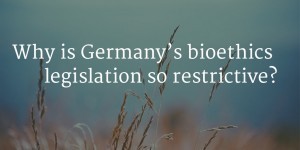Germany’s restrictive bioethics legislation in general, and its very tight rules on embryology and fertilisation in particular, present a puzzle for political science. Early on, the country has enacted liberal rules in other moral policy domains, most notably the abortion law of 1975 (Richardt, 2003: 113). The full range of prenatal diagnosis is available to German women, and the 1995 amendment has de facto legalised late abortions of otherwise viable babies with genetic or other defects right up to the moment of birth (Hashiloni-Dolev, 2007: 85) Yet, paradoxically, Germany’s 1990 Embryo Protection Act (EPA, 1990) gives absolute protection to fertilised eggs (zygotes) before implantation in the womb and so remains “one of the strictest laws on human embryology and fertilization in Europe” (Richardt, 2003: 112).
As usual, Germany is a strange place. A partial explanation is in my recent article (open access): Strange bedfellows: the Bundestag’s free vote on pre-implantation genetic diagnosis (PGD) reveals how Germany’s restrictive bioethics legislation is shaped by a Christian Democratic/New Left issue-coalition | Research & Politics
Discover more from kai arzheimer
Subscribe to get the latest posts sent to your email.


Why is Germany’s bioethics legislation so restrictive? – kai arzheimer https://t.co/9iML6auP93